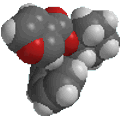- Functional groups : alkene and alkyne, therefore suffix = -en
and -yne
- The longest continuous chain is C6 therefore root = hex
- The first point of difference requires that we number from the
left as drawn
- Locant for C=C is therefore 1-
- Locant for C≡C is therefore 4-
hex-1-en-4-yne
|

CH2=CHCH2C≡CCH3 |
- Functional groups : alkene and alkyne, therefore suffix = -en
and -yne
- The longest continuous chain is C6 therefore root = hex
- The line drawing shows a cis or Z-alkene
- The first point of difference requires that we number from the
right as drawn
- Locant for C≡C is therefore 1-
- Locant for C=C is therefore 4-
cis-hex-4-en-1-yne
or
(Z)-hex-4-en-1-yne
|

CH3CH=CHCH2C≡CH |
- Functional groups : alkene and alkyne, therefore suffix = -en
and -yne
- The longest continuous chain is C5 therefore root = pent
- The first point of difference fails since C=C and C≡C are equally distant from the ends.
- Therefore the C=C takes priority and requires that we number from
the left as drawn
- Locant for C=C is therefore 1-
- Locant for C≡C is therefore 4-
pent-1-en-4-yne
|

CH2=CHCH2C≡CH |

